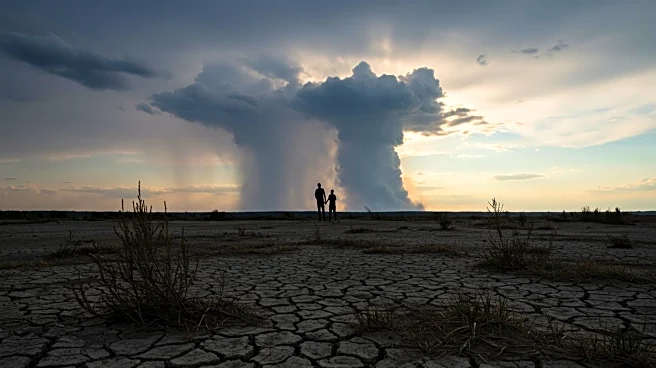What's Happening?
Over the past 80 years, more than 2,000 nuclear weapons have been detonated worldwide, with significant health and environmental impacts still felt today. The U.S. conducted numerous tests in Nevada and the Marshall Islands, leading to widespread radiation exposure among local populations, known as 'downwinders.' Mary Dickson, a survivor and advocate, highlights the ongoing psychological and health challenges faced by those exposed to fallout. Studies indicate increased cancer rates among affected communities, such as the Marshallese and residents near the Semipalatinsk test site in Kazakhstan. Despite international treaties curbing nuclear tests, the legacy of these detonations continues to affect lives and landscapes globally.
Why It's Important?
The historical nuclear tests have left a lasting impact on public health and the environment, raising concerns about radiation exposure and its long-term effects. Communities affected by these tests, including those in the U.S., Kazakhstan, and the Marshall Islands, continue to experience health issues and environmental degradation. The recognition and compensation for 'downwinders' vary, with some receiving financial aid while others struggle to prove their claims. This ongoing issue underscores the need for comprehensive policies addressing nuclear test survivors' health and environmental restoration, highlighting the broader implications for global security and humanitarian efforts.
What's Next?
As awareness of the long-term effects of nuclear testing grows, there is a push for increased compensation and support for affected communities. The U.S. recently expanded its compensation program for downwinders, potentially benefiting survivors like Mary Dickson. Internationally, there is a call for more robust measures to address the environmental damage and health risks associated with past nuclear tests. Advocacy groups continue to press for recognition and reparations, aiming to ensure that the lessons learned from these historical events inform future nuclear policies and humanitarian responses.
Beyond the Headlines
The ethical and cultural dimensions of nuclear testing are profound, as affected communities grapple with the legacy of these events. The secrecy and taboo surrounding test sites have hindered healing and acknowledgment of the full impact. Efforts to document and share survivor stories, such as those from Kazakhstan and the Marshall Islands, are crucial for restoring agency and understanding the humanitarian consequences of nuclear weapons. These narratives challenge the scientific community to integrate lived experiences into policy discussions, emphasizing the need for a holistic approach to nuclear justice.










